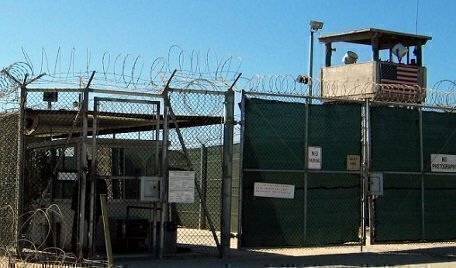Sending another strong signal that the troubled military commission system at Guantanamo Bay won’t be second-guessed by the Supreme Court, the Justices on Monday turned down an attempt to head off a major trial of a high-profile terrorism case. This marked the second time within a week that the court chose to bypass a Guantanamo case, and continued a pattern that has been followed for almost a decade.
 In a brief order, with no dissents noted, the court denied review of an appeal by lawyers for a Saudi Arabian national who has been held captive by U.S. officials for the past 15 years, but has yet to be put on trial. The detainee, Abd Al-Rahim Al-Nashiri, is facing charges that could lead to the death penalty if he is convicted.
In a brief order, with no dissents noted, the court denied review of an appeal by lawyers for a Saudi Arabian national who has been held captive by U.S. officials for the past 15 years, but has yet to be put on trial. The detainee, Abd Al-Rahim Al-Nashiri, is facing charges that could lead to the death penalty if he is convicted.
He is accused of war crimes for an alleged role in plotting the bombing of a U.S. warship, the U.S.S. Cole, in a harbor in Yemen in 2000 and a similar alleged plot against a French oil tanker in Yemen in 2002.
The U.S. government has conceded that, while being held overseas at secret “black sites” for four years after his capture in 2002, he was subjected to severe forms of torture, including “waterboarding” – a technique that has since been banned. His appeal to the Supreme Court contains many pages of gruesome detail about his treatment, and even some of that has been blocked out to conceal government secrets.
His lawyers contended that the abuse did not stop even after he was transferred to Guantanamo, a Navy facility on the island of Cuba, and that al-Nashiri now suffers from mental and physical injuries as a result of all of the mistreatment.\
The process of preparing the military’s case for trial has been frequently interrupted by problems that have become typical of the commission system at Guantanamo, so that there have been only eight individuals convicted, and half of those have been overturned on appeal. Long delays and deep controversies over trial procedures have plagued the system.
Now, the trial of al-Nashiri seems likely to be put off, probably for several more years, because the civilian lawyers who have been aiding in his legal defense have all been ordered by military supervisors to abandon their efforts, because of unexplained ethical issues. Some observers have said that this disruption is due to military spying on the private conversations that al-Nashiri has with his defense team. He still retains a military defense lawyer, but the controversy over claimed intrusions into his defense may have threatened any defense that might be put on for him.
In their appeal to the Supreme Court, al-Nashiri’s lawyers were attempting to make his case a test of whether the Guantanamo tribunals had any authority to try individuals for alleged crimes committed before the U.S. began a “war on terrorism” – in 2001 – and before the commissions were put into operation by Congress – in 2006. One of the charges against al-Nashiri pre-dated 2001 and the other pre-dated 2006.
A civilian federal appeals court in Washington, D.C., which has authority to review appeals from the Guantanamo tribunals, ruled that al-Nashiri could not challenge those commissions’ powers unless and until after he had been convicted in such a trial.
His lawyers told the Supreme Court in their appeal that his case may not go to trial until at least 2024, and his defense team has said recently that the new controversy over withdrawal of his civilian defense team could add additional years to the delay.
Aside from challenging the basic authority of the Guantanamo commissions, his appeal contended that he would be subjected to even further injuries by being put to trial with the looming prospect of a death sentence if he were convicted. Those injuries, the appeal contended, would flow directly from the years of torture he underwent.
Further, the appeal was an attempt by his defense team to revitalize the ancient writ of habeas corpus – allowing those held prisoner to challenge the basis for their continued captivity. The Supreme Court itself gave Guantanamo detainees the right to challenge their conviction under that theory; it did so in its 2008 decision in the case of Boumediene v. Bush – the Justices’ last major ruling on a Guantanamo case.
However, in a series of decisions since then by the U.S. Court of Appeals for the District of Columbia Circuit, the legal remedy of habeas corpus has been of little benefit for Guantanamo prisoners. Of the many who have been released from Guantanamo, almost all left that military prison without winning a habeas corpus claim. The releases have been by the action of the government.
Only 41 detainees now remain at Guantanamo. The highest visibility case that is still struggling toward an actual trial involves charges against five individuals accused of major roles in the terrorist attacks on the U.S. almost 16 years ago.
Legendary journalist Lyle Denniston has written for us as a contributor since June 2011 and has covered the Supreme Court since 1958. His work also appears on lyldenlawnews.com.







